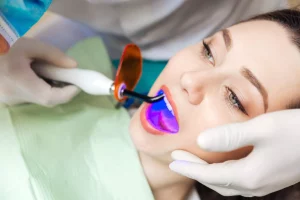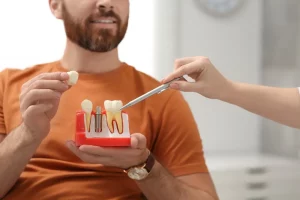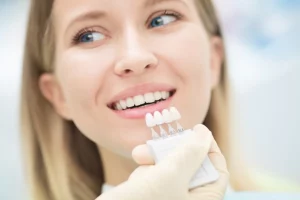Last Updated on: 12th December 2025, 09:35 am
Dental cavities in toddlers are dangerous given that they damage baby teeth, cause pain, and can affect how permanent teeth grow. Without treatment, cavities may lead to infections, poor eating habits, and costly future dental problems. Early visits to the dentist, like at Channel Islands Family Dental Office, help protect children’s smiles.
Dental cavities in toddlers may seem harmless because baby teeth will eventually fall out; in reality, they can be very dangerous. Cavities at this age spread quickly and, if left untreated, can cause pain, infections, and even affect how permanent teeth grow.
Even with this information, there are very high rates of tooth decay in children. Research shows that more than 40% of children between the ages of 2 and 11 develop cavities in their primary teeth.
At Channel Islands Family Dental Office, we often see how fast these problems progress; thus we encourage parents to schedule early checkups to keep their little ones’ smiles healthy.
Table of Contents
ToggleWhat are dental cavities in toddlers?
Dental cavities in toddlers are small holes or lesions that form in baby teeth. They happen when:
- bacteria feed on sugars and starch residues from food.
- the bacteria produce acids.
- the acids demineralize enamel, perforate the deeper layers of the tooth, and cause permanent damage.
Pediatric dental caries are especially frequent because children’s teeth are softer and less mineralized than adult teeth, making them more vulnerable to bacterial attacks.
What causes dental cavities in toddlers?
There is no single cause. Cavities usually happen because of a mix of small daily habits and certain risk factors. Let’s see them step by step:
- Poor oral hygiene: Toddlers cannot brush well on their own, so plaque builds up easily.
- Sugary diet: Juices, candies, and soft drinks feed bacteria that damage enamel.
- Sticky foods: Cookies, gummies, or dried fruits remain on teeth longer and make cleaning harder.
- Bottle habits: Falling asleep with milk or juice in a bottle keeps sugars in the mouth overnight.
- Genetics: Some kids have weaker enamel, which means less protection against cavities.
- Low fluoride: Without enough fluoride in toothpaste or drinking water, enamel is less resistant.
The Centers for Disease Control and Prevention (CDC) emphasizes that cavities are the most common chronic disease of childhood in the United States. Evidently tooth decay in toddlers is not a minor or isolated problem, but a widespread health issue that parents need to recognize early.
What signs show toddler tooth decay?
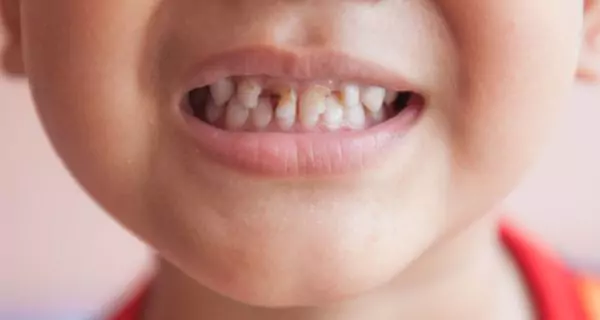
Cavities do not always cause pain at the beginning. That is why parents should check their child’s mouth frequently to detect early changes.
The signs usually appear step by step as the condition advances:
1. Early stage: white spots
- The first visible sign is small chalky white spots on the surface of the teeth.
- These indicate a loss of minerals in the enamel (demineralization).
- At this stage, caries can still be reversible with fluoride and proper hygiene.
2. Progressive stage: brown or dark stains
- The white spots gradually turn yellow, brown, or black.
- This shows that the enamel has been weakened further by acids from bacteria.
3. Cavity formation: small holes or pits
- As the enamel breaks down, tiny holes appear in the teeth.
- Children may begin to feel sensitivity to sweets, cold, or hot foods.
4. Pain and discomfort
- When decay reaches the dentin, the child could experience toothache.
- Pain is noticeable when chewing, brushing, or even spontaneously at rest.
5. Advanced stage: swelling or abscess
- If bacteria reach the pulp (nerve), an infection can develop.
- This often causes gum swelling or a small pus bubble (abscess).
- At this point, urgent dental treatment is necessary.
Even if you do not see symptoms, it is essential to schedule early visits with a pediatric dentist. Professionals can detect hidden problems that parents may overlook.
When should you see a dentist?
The ideal is not to wait until your child is in pain; you should visit the dentist from an early stage.
Schedule a dentist visit if you notice:
- tooth sensitivity or constant pain
- white, brown, or black spots on teeth
- gum swelling or small abscesses
- trouble chewing or refusing to eat
The sooner your child is seen, the easier and less painful the treatment will be.
What treatments are available for cavities in children?
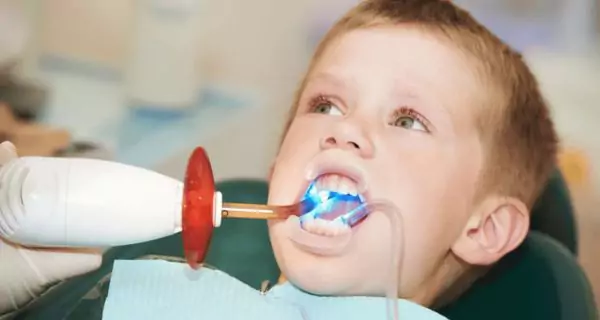
The treatment a child needs depends on how deep the cavity is and the age of the patient. Pediatric dentists usually choose the least invasive procedure possible to save the tooth until the permanent one is ready to erupt.
Common treatments include:
- Fillings: used for small cavities that have not reached the nerve. They restore function and stop decay from spreading.
- Stainless steel crowns: recommended when a large portion of the tooth is damaged, offering durable protection.
- Pulpotomy: performed when decay has reached the nerve of the baby tooth, similar to a root canal, to eliminate infection and preserve the tooth.
- Extraction: In very severe cases, when the tooth cannot be saved, removal may be necessary to stop pain and infection. Dentists only extract when absolutely necessary, since baby teeth play a key role in guiding permanent teeth.
Early treatments are essential since they not only fix a tooth but also protect the child’s health, comfort, and future smile.
What are the consequences of untreated cavities in toddlers?

Parents often believe baby teeth do not matter because they will fall out eventually. This is a dangerous misconception. Cavities that are not treated can cause a chain reaction of problems that go beyond oral health and affect a child’s overall development.
Can untreated cavities cause pain and sleep problems?
Yes, as cavities progress, they expose sensitive layers of the tooth and can reach the nerve. This produces constant pain that may interfere with daily life:
- difficulty eating and speaking
- discomfort while brushing
- interrupted sleep due to a toothache
Sleep disruption lowers energy, affects mood, and reduces school performance.
Do cavities affect nutrition?
Absolutely. When chewing becomes painful, children may avoid:
- fruits and vegetables (crunchy or fibrous).
- meats and proteins that require more chewing.
- hard or textured foods in general.
Over time, this leads to poor nutrition, vitamin and mineral deficiencies, and a higher risk of growth and development problems.
Can cavities cause infections?
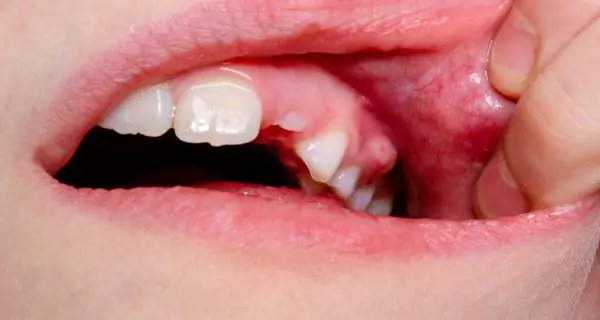
Yes, if bacteria spread beyond the enamel and dentin into the pulp, a gum abscess can form. This infection may cause:
- swelling and redness in the gums
- fever and general malaise
- In severe cases, bacteria can spread to other parts of the face or body –a serious medical risk for a child.
Do untreated cavities affect permanent teeth?
Definitely. Baby teeth act as natural guides for permanent teeth. If lost too early due to decay:
- Spaces may close too soon.
- Permanent teeth may erupt, crooked or crowded.
- The child may later require orthodontic treatments.
Can dental caries alter jaw development?
Yes, problems appear when:
- children lose baby teeth prematurely.
- pain leads them to chew only on one side.
This can affect jawbone growth, bite alignment, and long-term oral function.
Are untreated cavities more expensive to fix later?
Yes, a small filling is simple and affordable, but if ignored, cavities may require:
- crowns
- nerve treatments (pulpotomy or pulpectomy)
- tooth extractions
These are more invasive, costly, and stressful for both the child and the parents.
Dental cavities in toddlers are not harmless. If they are not treated, they can cause pain, infections, and future problems with permanent teeth. Taking care of your child’s mouth from the very beginning is the best step you can take to protect them from cavities.
How can parents prevent dental cavities in toddlers?

Keeping your child cavity-free is easier than many parents think. The secret is to start early and make oral care a normal part of daily life.
Before the first tooth
Even before teeth appear, you can care for your baby’s mouth:
- Gently wipe the gums and tongue with a soft, damp cloth or silicone finger brush.
- This clears away milk residue and bacteria.
- It also helps your baby get used to the feeling of oral care from the start.
When teeth begin to erupt
Once those little teeth show up, it’s time to build simple routines that protect them all their lives:
- Brush twice a day: Use a small, soft-bristled toothbrush and a tiny amount of fluoride toothpaste that matches your child’s age.
- Watch the sugar: Offer water instead of juice or soda, and keep candy and sticky snacks as occasional treats.
- No bottle in bed: Avoid letting your child fall asleep with milk or juice, since sugars stay on the teeth all night, you can change it for water.
- See the dentist early: Schedule the first visit by age 1 (or six months after the first tooth). A pediatric dentist will check your child’s teeth and give you practical guidance for daily care.
- Make it fun: Turn brushing into a game or brush together as a family so your child looks forward to it instead of resisting.
What kind of toothpaste should children use?

The right toothpaste depends on your child’s age and fluoride needs:
- From first tooth to age 3: use 1000 ppm fluoride toothpaste, just a smear the size of a grain of rice.
- Ages 3–6: keep using 1000 ppm fluoride toothpaste, but increase to a pea-sized amount.
- From age 6 and up: switch to 1450 ppm fluoride toothpaste, pea-sized.
Using the right toothpaste in the right amount helps strengthen enamel and gives children the best protection against cavities. Always check with your pediatric dentist, since fluoride needs can vary, and they can guide you on what’s best for your child.
Looking for trusted pediatric dental care near you?
Parents need a dental team that truly understands children.
At Channel Islands Family Dental Office, families receive gentle, preventive, and restorative care.
Locations: Ventura, Newbury Park, Oxnard, Santa Paula, and Port Hueneme
We provide:
- Specialized pediatric dentists with experience treating toddlers
- A friendly, relaxed environment to reduce fear
- Focus on prevention and early treatment
Protect your toddler’s smile today. Schedule an appointment with Channel Islands Family Dental Office.
Frequently Asked Questions (FAQ)
No. Once a cavity starts, it does not go away without treatment. In fact, cavities get worse over time. A dentist must treat the tooth to stop the decay and protect the rest of the mouth.
They can be. Early cavities may not hurt, but as they grow, they can cause tooth sensitivity, pain when chewing, or even constant toothaches. Pain is often a sign that the cavity has advanced and needs urgent dental care.
Crunchy fruits and vegetables (like apples, carrots, and celery), cheese, plain yogurt, and nuts are great options. Avoid sticky, sugary snacks like gummies, raisins, and candy that cling to teeth.
Absolutely. Pediatric dentists are trained to work with young children and use safe, child-friendly techniques. In some cases, sedation may be recommended for very young children with extensive dental needs, but this is always carefully monitored.
The American Academy of Pediatric Dentistry recommends the first visit by age 1, or within six months of the first tooth erupting. Early visits help prevent cavities and teach parents how to care for their child’s teeth at home.
Voice Search Snippets (Q&A)
References
1. Butera, A., Maiorani, C., Morandini, A., Simonini, M., Morittu, S., Trombini, J., & Scribante, A. (2022). Evaluation of children Caries risk factors: A narrative review of nutritional aspects, oral hygiene habits, and bacterial alterations. Children, 9(2), 262. https://doi.org/10.3390/children9020262
2. CDC. (2024, May 15). Oral health tips for children. https://www.cdc.gov/oral-health/prevention/oral-health-tips-for-children.html
3. Krol, D. M., & Whelan, K. (2022b). Maintaining and improving the oral health of young children. PEDIATRICS, 151(1). https://doi.org/10.1542/peds.2022-060417
4. Marcin, A. (2021, September 17). Treating cavities in your toddler, and how to prevent more. Healthline. https://www.healthline.com/health/dental-and-oral-health/toddler-cavities
5. NIDCR. (2025). Dental caries (Tooth decay) in children ages 2 to 11 years. https://www.nidcr.nih.gov/research/data-statistics/dental-caries/children







